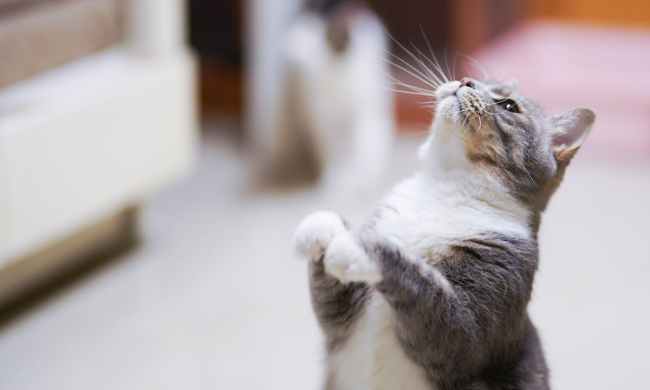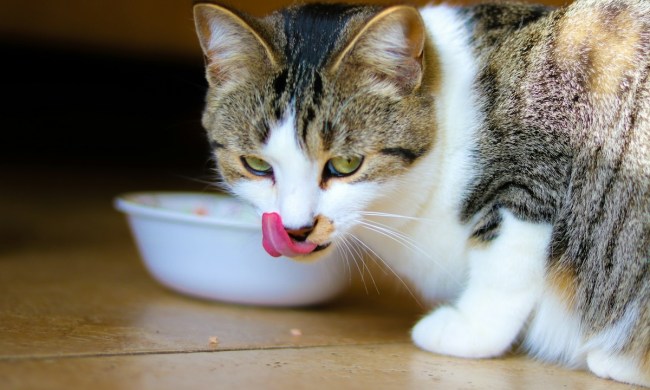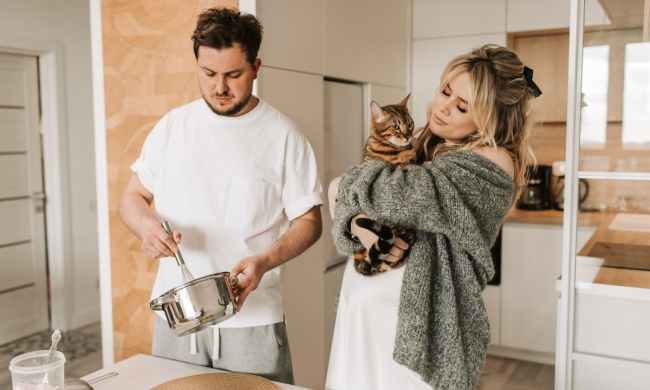Pecan pie is a holiday table staple. The tree nut is also a favorite ingredient in holiday cookies and a delicious, filling year-round snack for humans. Cat parents know they need to care about the types of foods they leave out. Even the best food storage practices require thinking one or two steps ahead of your mischievous, curious, and feisty feline.
The added work is essential — some foods are toxic to cats, such as macadamia nuts. However, not all foods, including quintessential holiday dishes like turkey, are poisonous to cats. Can cats eat pecans? Unlike a tuxedo cat, the answer to this question isn’t black and white. We’ll scratch below the surface to give you the nuanced answer on whether cats can — and importantly, should — eat pecans.
Can cats eat pecans?

Technically, yes, cats can eat pecans. The tree nut itself, in whole form, is not considered toxic to cats, and nut allergies are rare. However, just because cats can consume pecans doesn’t mean they should.
Cats are obligate carnivores, meaning most of their nutrition comes from animal protein. Cat food is designed for your cat’s digestive system to meet their nutritional needs. Pecans are not. Biologically, cats don’t have the enzymes to digest pecans. While you may want to use this tree nut as a treat, the truth is that your cat’s stomach likely won’t agree. Pecans can also contain mold, which our naked eyes cannot always detect and can lead to more severe health issues.
Are pecans toxic to cats?

Pecans in plain, whole form are not considered toxic to cats. However, pecans are often used as an ingredient in trail mixes and other recipes that could contain toxins. For instance, trail mixes could have macadamia nuts, chocolate chips, and raisins, none of which are safe for a kitty to consume.
Trail mixes and baked goods can also contain items that — while not toxic — contain added sugar. Consumed consistently, added sugar raises the odds that your cat develops diabetes. In the short term, your cat may get a stomachache. Pecans are also high in calories and fat, putting your kitty at risk for obesity. Salted pecans can lead to uncomfortable bloating, excessive thirst, GI discomfort, and even kidney failure when consumed in large quantities.
One of the more significant short-term issues with letting your cat eat pecans is the risk of mold consumption. Nuts like pecans and walnuts often contain mold, which we can’t always spot without a microscope. Eating something moldy can have mild but uncomfortable side effects, like stomachaches, or more severe ones, such as seizures and nerve damage. Your best bet is to steer clear of giving your cat pecans.
Rarely, cats may have a nut allergy. Signs your cat is not reacting well to eating pecans include:
- Constipation
- Diarrhea
- Vomiting
- Fever
- Bloating
- Poor appetite
- Lethargy
- Weakness
- Tremors
- Blood in stool
If you notice these signs, call the vet for prompt care.
Are pecans healthy for cats?

Pecans are full of omega-3 fatty acids that benefit humans when consumed as part of a well-balanced diet. However, there’s no evidence we can say the same for our feline friends. The excess fat and calories can put your kitty (which has considerably lower daily caloric needs than you do) at a higher risk of gaining too much weight. Your cat receives the most benefits from consuming the food designed for them, and your veterinarian can make recommendations for portion sizes and types, especially if your cat has food allergies or intolerances.
Some human foods, such as eggs and tuna, are safer for cats and better tolerated than pecans. Still, ensure your cat doesn’t fill up on treats to the point that they stop eating their regular diet.
Closing thoughts

Pecans aren’t toxic to cats, so you probably don’t need to worry if your kitty swiped some off your plate. Still, you’ll want to avoid intentionally giving pecans to your cat. Pecans can contain mold. You may not see the mold, but it might be there and cause side effects, such as vomiting, diarrhea, seizures, and nerve damage. Trail mixes with pecans and toxins, like chocolate or raisins, aren’t safe.
Pecan pie and salted pecans are also no-gos because of the excess salt and sugar. Pecans have health benefits for humans, but cats are designed to eat a mostly carnivore diet. Their food has the vitamins and minerals they need. Feeding high-calorie treats like pecans may make them less inclined to chow down on their food and get the nutrients their body craves.




